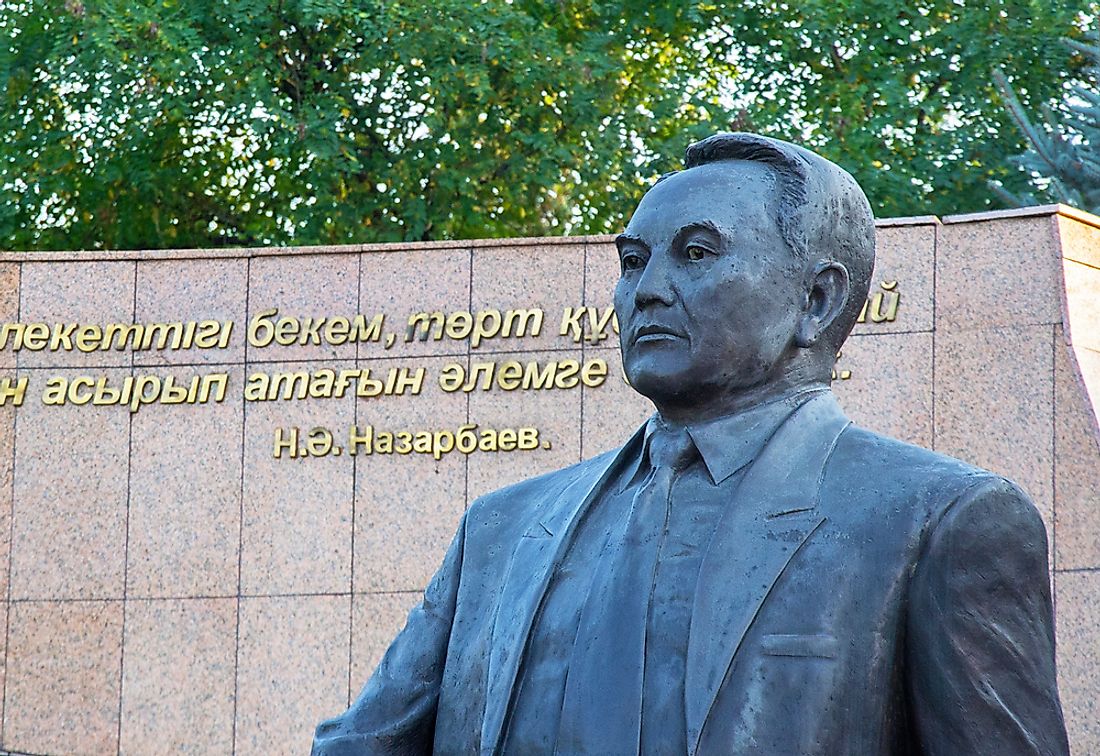Who Was the First President of Kazakhstan?

Kazakhstan is a presidential republic where the President is the head of state. The first president of Kazakhstan was Nursultan Nazarbayev.
5. Early Life
Nursultan Nazarbayev was born in the Kazakh Soviet Socialist Republic, which was part of the Soviet Union, on July 6th, 1940. Nazarbayev grew up as the son of poor Kazakh peasants but managed to graduate from three different schools. In 1960 he graduated from a technical school in the town of Dniprodzerzhynsk, Ukraine. In 1967, he graduated from the Karaganda Metallurgical Combine, a technical school in the city of Karaganda, Kazakhstan. Finally, in 1976 he graduated from the Higher Party School in Moscow, Russia. During his schooling years, he worked on and off at a steel plant in Karaganda as a steelworker and later engineer. He also joined the Communist Party of the Soviet Union (CPSU) in 1962.
4. Rise to Power
After joining the CPSU, Nazarbayev worked his way up the ranks, and by 1979 he became a full member of the Kazakhstan Politburo, the supreme policy-making body of the Communist party in Kazakhstan. From 1984 to 1989 he was the chairman of the Kazakh Council of Ministers. Following this, his rise to power was encapsulated as he became the first secretary of the Kazakhstan party from 1989 to 1991, a full member of the CPSU Politburo from 1990 to 1991 and in 1990 he was elected as the President of the Republic of Kazakhstan. In August 1991, he resigned his seat for the Politburo and by December Nazarbayev led the country to declare complete independence from the Soviet Union. He also helped to form the Commonwealth of Independent States that December, helping to give the country economic independence from Russia while still cooperating with them economically. Having been the leader of the country since 1989, Nazarbayev has easily won reelection in 1999, 2005, 2011 and 2015. In 1999 he won with about 81% of the votes but has won 91% or more in each election since. In 2010 the parliament of Kazakhstan gave him the title of "Leader of the Nation".
3. Contributions
During his time as President, Nazarbayev helped to drastically reform the economy from a system of state ownership under communism to a capitalist system that has led to the country having mostly growth and prosperity. During his time as President, the capital of Kazakhstan officially moved from the city of Almaty to Astana (now Nur-Sultan) in 1997. He has also managed to maintain mostly good relationships with America, Western Europe, and Israel, having done billions of dollars in bilateral trade with them. He has also maintained strong ties with Russia, having signed a treaty with them and Belarus to create the Eurasian Economic Union (EAEU). In his 2012 State of the Nation address, Nazarbayev announced his Kazakhstan 2050 Strategy, whose long-term goal is to make his nation one of the most developed nations on Earth by 2050.
2. Challenges
In December 2011, the 2011 Mangystau riots broke out as one of the biggest opposition movements to Nazarbayev's government during his time as president. The demonstrators clashed with police in the city of Zhanaozen, where 15 people were killed and about 100 injured. In the few days after this event, the protest spread but eventually it died down. During the trail for the protesters, they accused that they had been abused and tortured by police while in custody. The Kazakhstani newspaper Respublika has reported on the corruption of Nazarbayev's government since it was founded in 2000. The paper has been ordered to close in 2002 and 2005 but continued publishing until 2012 when the publication was suspended again barring a verdict of criminal charges against the paper.
1. Approval and Criticism in Kazakhstan and Abroad
Nazarbayev has been lauded by some for the political and economic reforms he has made during his time as president, helping to guide the country out of the Soviet system and into a more democratic system with a growing economy. Other groups like the Organization for Security and Cooperation in Europe (OSEC) have criticized the politics of the country under Nazarbayev saying that none of the presidential elections have met international democratic standards. His government has also been accused of human rights abuses, corruption, suppressing dissent, conducting an authoritarian regime and promoting favoritism towards certain families.







